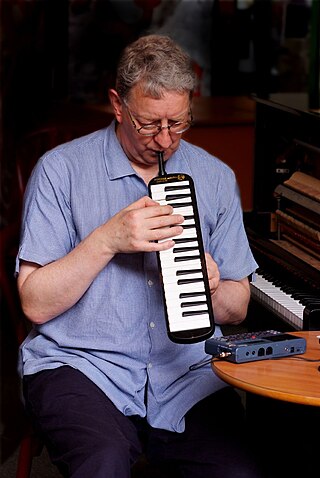Related Research Articles

John Zorn is an American composer, conductor, saxophonist, arranger and producer who "deliberately resists category". His avant-garde and experimental approaches to composition and improvisation are inclusive of jazz, rock, Jewish music, hardcore, classical, contemporary, surf, metal, soundtrack, ambient, and world music. Rolling Stone noted that "[alt]hough Zorn has operated almost entirely outside the mainstream, he's gradually asserted himself as one of the most influential musicians of our time".

Steve Beresford is a British musician who graduated from the University of York He has played a variety of instruments, including piano, electronics, trumpet, euphonium, bass guitar and a wide variety of toy instruments, such as the toy piano. He has also played a wide range of music. He is probably best known for free improvisation, but has also written music for film and television and has been involved with a number of pop music groups.

Cecil Percival Taylor was an American pianist and poet.

Dave Douglas is an American jazz trumpeter, composer, and educator. His career includes more than fifty recordings as a leader and more than 500 published compositions. His ensembles include the Dave Douglas Quintet; Sound Prints, a quintet co-led with saxophonist Joe Lovano; Uplift, a sextet with bassist Bill Laswell; Present Joys with pianist Uri Caine and Andrew Cyrille; High Risk, an electronic ensemble with Shigeto, Jonathan Aaron, and Ian Chang; and Engage, a sextet with Jeff Parker, Tomeka Reid, Anna Webber, Nick Dunston, and Kate Gentile.

Samuel Carthorne Rivers was an American jazz musician and composer. Though most famously a tenor saxophonist, he also performed on soprano saxophone, bass clarinet, flute, harmonica, piano and viola.

Impulse! Records is an American jazz record label established by Creed Taylor in 1960. John Coltrane was among Impulse!'s earliest signings. Thanks to consistent sales and positive critiques of his recordings, the label came to be known as "the house that Trane built".
"Giant Steps" is a jazz composition by American saxophonist John Coltrane. It was first recorded in 1959 and released on the 1960 album Giant Steps. The composition features a cyclic chord pattern that has come to be known as Coltrane changes. The composition has become a jazz standard, covered by many artists. Due to its speed and rapid transition through the three keys of B major, G major and E♭ major, Vox described the piece as "the most feared song in jazz" and "one of the most challenging chord progressions to improvise over" in the jazz repertoire.

Keith Graham Tippetts, known professionally as Keith Tippett, was a British jazz pianist and composer. According to AllMusic, Tippett's career "...spanned jazz-rock, progressive rock, improvised and contemporary music, as well as modern jazz for more than half-a-century". He held "an unparallelled place in British contemporary music," and was known for "his unique approach to improvisation". Tippett appeared and recorded in many settings, including a duet with Stan Tracey, duets with his wife Julie Tippetts, solo performances, and as a bandleader.

Festival Records, later known as Festival Mushroom Records, was an Australian recording and publishing company founded in Sydney, Australia, in 1952 and operated until 2005.
Babel Label is a jazz record label founded in 1994 by Oliver Weindling that specialises in British jazz, particularly the London scene. It released more than 130 recordings in its first 20 years, two of which were nominated for the Mercury Prize.
Smithsonian Folkways is the nonprofit record label of the Smithsonian Institution. It is a part of the Smithsonian's Smithsonian Center for Folklife and Cultural Heritage, located at Capital Gallery in downtown Washington, D.C. The label was founded in 1987 after the family of Moses Asch, founder of Folkways Records, donated the entire Folkways Records label to the Smithsonian. The donation was made on the condition that the Institution continue Asch's policy that each of the more than 2,000 albums of Folkways Records remain in print forever, regardless of sales. Since then, the label has expanded on Asch's vision of documenting the sounds of the world, adding six other record labels to the collection, as well as releasing over 300 new recordings. Some well-known artists have contributed to the Smithsonian Folkways collection, including Pete Seeger, Ella Jenkins, Woody Guthrie, and Lead Belly. Famous songs include "This Land Is Your Land", "Goodnight, Irene", and "Midnight Special". Due to the unique nature of its recordings, which include an extensive collection of traditional American music, children's music, and international music, Smithsonian Folkways has become an important collection to the musical community, especially to ethnomusicologists, who utilize the recordings of "people's music" from all over the world.

Trevor Charles Watts is an English jazz and free-improvising alto and soprano saxophonist.

Paul Dunmall is a British jazz musician who plays tenor and soprano saxophone, as well as the baritone and the more exotic saxello and the Northumbrian smallpipes. He has played with Keith Tippett and Barry Guy.
Hathut Records is a Swiss record company and label founded by Werner Xavier Uehlinger in 1974 that specializes in jazz and classical music. The name of the label comes from the artwork of Klaus Baumgartner. Hathut encompasses the labels hat ART, hatOLOGY, and hat NOIR.
Colin Harper is an Irish non-fiction author and composer.

Maggie Nicols, is a Scottish free-jazz and improvising vocalist, dancer, and performer.

Philipp John Paul Wachsmann is an African avant-garde jazz/jazz fusion violinist born in Kampala, Uganda, probably better known for having founded his own group Chamberpot. He has worked with many musicians in the free jazz idiom, including Tony Oxley, Fred van Hove, Barry Guy, Derek Bailey and Paul Rutherford, among many others. Wachsmann is especially known for playing within the electronica idiom.

Fontessa is a 1956 album by the Modern Jazz Quartet released on Atlantic Records. It was the first of their albums released on Atlantic. The album was released in the USA in mono on the black Atlantic label with catalogue number 1231. It was released in the USA in stereo on the green Atlantic label with catalogue number SD 1231. The prefix SD stands for Stereo Disc. The current internationally available CD release is the mono version. A Japanese CD exists of the stereo version. Additionally both mono and stereo versions were released in many other territories, for example the UK with London LTZ-K 15022 for the mono and London SAH-K 6031 for the stereo. The 11-minute title tune by the group's pianist and musical director John Lewis was inspired by Commedia dell'arte, and the four characters depicted in it are pictured on the cover. Lewis wrote of it in the liner notes:
Fontessa is a little suite inspired by the Renaissance Commedia dell’Arte. I had particularly in mind their plays which consisted of a very sketchy plot and in which the details, the lines, etc. were improvised. This suite consists first of a short Prelude to raise the curtain and provide the theme. The first piece after the Prelude has the character of older jazz and improvised parts are by the vibraphone. This piece could perhaps be the character of Harlequin. The second piece has the character of less older jazz and the improvised parts are played by the piano. The character here could perhaps be Pierrot. The third piece is of a still later jazz character and develops the main motif. The improvised parts are by the drums. This character could perhaps be Pantaloon. The opening Prelude closes the suite. Fontessa is the three-note main motif of the suite and is perhaps a substitute for the character of Colombine.

Roger Turner is an English jazz percussionist. He plays the drumset, drums, and various percussion, and was brought up into the jazz and visual art cultures inhabited by his older brothers, playing drums from childhood in informal jazz contexts.

John Russell was an acoustic guitarist who worked in free improvisation beginning in the 1970s. He promoted concerts and appeared on more than 50 recordings.
References
- 1 2 3 4 5 6 7 8 9 10 11 12 13 14 Sharpe, John (November 2017). "FMR". The New York City Jazz Record . No. 187. pp. 11, 42.
- ↑ Taylor, Trevor (April 2017). "FMR Label Head Trevor Taylor Remembers Roland's Electronic Pioneer Ikutaro Kakehashi". The Wire. London. Retrieved 16 January 2019.
- ↑ Margasak, Peter (November 2015). "Subradar Expands Reach". DownBeat . Vol. 82, no. 11. p. 18.
- ↑ "FMR: Future Music Records". efi.group.shef.ac.uk. Archived from the original on 28 September 2011. Retrieved 5 April 2011.